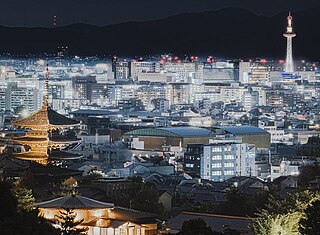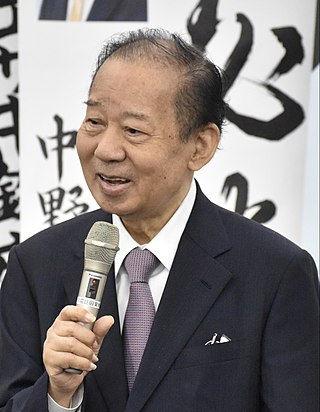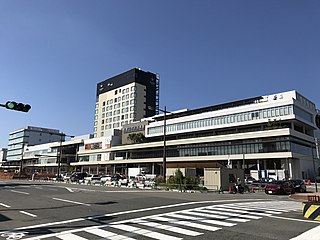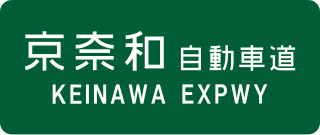Related Research Articles

Wakayama Prefecture is a prefecture of Japan located in the Kansai region of Honshu. Wakayama Prefecture has a population of 944,320 and has a geographic area of 4,724 square kilometres (1,824 sq mi). Wakayama Prefecture borders Osaka Prefecture to the north, and Mie Prefecture and Nara Prefecture to the northeast.

The Yamatoji Line is the common name of the western portion of the Kansai Main Line. The line is owned and operated by West Japan Railway Company, and starts at Kamo Station in Kyoto Prefecture and ends at JR Namba Station in Naniwa-ku, Osaka.

The Hanwa Line is a commuter rail line in the Osaka-Kobe-Kyoto Metropolitan Area, owned and operated by West Japan Railway Company. The 61.3 km line runs between Osaka and Wakayama, Japan and has a 1.7 km branchline in a southern Osaka suburb. The name is taken from the second syllable of Osaka and the first syllable of Wakayama.

Kii Province, or Kishū (紀州), was a province of Japan in the part of Honshū that is today Wakayama Prefecture, as well as the southern part of Mie Prefecture. Kii bordered Ise, Izumi, Kawachi, Shima, and Yamato Provinces. The Kii Peninsula takes its name from this province.

Keihanshin is a metropolitan region in the Kansai region of Japan encompassing the metropolitan areas of the cities of Kyoto in Kyoto Prefecture, Osaka in Osaka Prefecture and Kobe in Hyōgo Prefecture. The entire region has a population of 19,302,746 over an area of 13,228 km2 (5,107 sq mi). It is the second-most-populated urban region in Japan, containing approximately 15% of Japan's population.

An ironworks or iron works is an industrial plant where iron is smelted and where heavy iron and steel products are made. The term is both singular and plural, i.e. the singular of ironworks is ironworks.

Tomisaburō Wakayama, born Masaru Okumura, was a Japanese actor best known for playing Ogami Ittō, the scowling, 19th-century ronin warrior in the six Lone Wolf and Cub samurai films.

Toshihiro Nikai is a Japanese politician for the Liberal Democratic Party (LDP) and the leader of the LDP Shisuikai faction, who served as the Secretary-General of the LDP from 2016 to 2021. He was previously the Minister of Economy, Trade and Industry. Nikai is currently serving in his eighth term in the Lower House representing Wakayama's Third District. He is widely considered to be "Japan's most pro-China lawmaker". He has also been criticized for misogynistic views expressed in the past, and caused controversy when he invited women to "look, but not talk" at key party meetings.

Kinokawa is a city in Wakayama Prefecture, Japan. As of 30 November 2021, the city had an estimated population of 60,592 in 26652 households and a population density of 270 persons per km². The total area of the city is 228.21 square kilometres (88.11 sq mi).

Wakayama Station is an interchange passenger railway station located in the city of Wakayama, Wakayama Prefecture, Japan, jointly operated by the West Japan Railway Company and the private railway company Wakayama Electric Railway.

The Nankai Main Line is one of the two main railway lines of Japanese private railway company Nankai Electric Railway, together with Kōya Line. The route is from Namba Station in south downtown of Osaka to Wakayamashi Station in Wakayama via Sakai, Izumiōtsu, Kishiwada, Kaizuka, Izumisano, Sennan, Hannan and Misaki municipalities. The proper name is with the company's name, "the Nankai Main Line", not simply "the Main Line" often seen in other Japanese private railways. Lines of the Nankai Main Lane and the connecting lines excluded the Kōya Line and the Airport Line are named generically "the Nankai Line". The line is shown with a pictogram of waves, or distinguished with blue from conifer or green Kōya Line.

Wakayama is the capital city of Wakayama Prefecture in the Kansai region of Japan. As of 1 December 2021, the city had an estimated population of 351,391 in 157066 households and a population density of 1700 persons per km². The total area of the city is 208.84 square kilometres (80.63 sq mi).

The Kisei Main Line is a railway line that parallels the coastline of the Kii Peninsula in Japan between Mie Prefecture and Wakayama Prefecture. The name takes the kanji characters from the names of the old provinces of Kii (紀伊) and Ise (伊勢).

The Wakayama Line is a railway line that links Nara Prefecture to Wakayama Prefecture in Japan, operated by West Japan Railway Company. It connects Ōji Station on the Yamatoji Line to Wakayama Station on the Hanwa Line and Kisei Main Line, with through train service to JR Namba via the Yamatoji Line and to Nara via the Sakurai Line.

National Route 24 is a national highway connecting Kyoto and Wakayama in Japan.

National Route 26 is a national highway connecting Osaka and Wakayama in Japan.

National Route 42, also called Kumano Kaidō or Tropical Route is a national highway connecting Hamamatsu, Shizuoka and Wakayama, Wakayama in Japan. Part of the route requires crossing Ise Bay on the Ise-wan Ferry.

Tama was a female calico cat who gained fame for being a station master and operating officer at Kishi Station on the Kishigawa Line in Kinokawa, Wakayama Prefecture, Japan.

Wakayamashi Station is an interchange passenger railway station located in the city of Wakayama, Wakayama Prefecture, Japan, operated by the private railway company Nankai Electric Railway.. To distinguish it from Wakayama Station, the station is called "City Station".

The Keinawa Expressway is a 104.9-km-long north–south National Highway with access control in the Kinki region of Japan that connects Kyoto Prefecture to Wakayama Prefecture via Nara Prefecture. It is numbered "E24" under Ministry of Land, Infrastructure, Transport and Tourism's "Expressway Numbering Systemg."